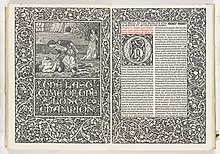High fantasy
| Fantasy |
|---|
| Media |
|
| Genre studies |
|
| Subgenres |
|
| Fandom |
| Categories |
| Literature |
|---|
|
| List of high fantasy fiction |
High fantasy, or epic fantasy, is a
Characteristics
The romances of

Many high fantasy stories are told from the viewpoint of one main hero. Often, much of the plot revolves around their heritage or mysterious nature, along with a world-threatening problem. In many novels the hero is an orphan or unusual sibling, and frequently portrayed with an extraordinary talent for magic or combat. They begin the story young, if not as an actual child, or are portrayed as being very weak and/or useless.[8]
The hero often begins as a childlike figure, but matures rapidly, experiencing a considerable gain in fighting/problem-solving abilities along the way.[9]
The progress of the story leads to the character's learning the nature of the unknown forces against them, that they constitute a force with great power and malevolence. The villains in such stories are usually completely evil and unrelatable.[10]
"High fantasy" often serves as a broad term to include a number of different flavors of the fantasy genre, including
Themes
High fantasy has often been defined by its themes and messages.
Game settings
Role-playing games such as Dungeons & Dragons with campaign settings like Dragonlance[16] by Tracy Hickman and Margaret Weis and Forgotten Realms by Ed Greenwood[17] are a common basis for many fantasy books and many other authors continue to contribute to the settings.[18]
See also
- Heroic fantasy– Genre of fantasy fiction
- Historical fantasy – Genre of fiction
- List of genres
- List of high fantasy fiction
- Low fantasy – Subgenre of fantasy fiction defined by a "mundane" setting
- Sword and sorcery – Genre of fantasy fiction
References
- ^ "Defining the Genre: High Fantasy". fandomania. 11 May 2011. Archived from the original on 22 March 2019. Retrieved 8 August 2016.
High Fantasy is probably one of the most recognizable subgenres of Fantasy.
- ^ ISBN 0-8108-6829-6
- ISBN 978-0-87207-257-2.
- ISBN 978-1-56308-987-9.
- ISBN 978-1-4129-3013-0.
- ^ C.W. Sullivan has a slightly more complex definition in "High Fantasy", chapter 24 of the International Companion Encyclopedia of Children's Literature by Peter Hunt and Sheila G. Bannister Ray (Routledge, 1996 and 2004), chapter 24.
- ^ ISBN 031215173X.
- ISBN 1-932265-07-4.
- ^ MasterClass (26 May 2022). "High Fantasy Books: 6 Characteristics of High Fantasy". MasterClass.
- ISBN 0-87116-195-8
- ISBN 978-0-7869-6562-5.
- ^ a b Joseph A. McCullough V, "The Demarcation of Sword and Sorcery Archived 10 October 2008 at the Wayback Machine"
- ^ Wolfgang, Baur (2012). "How Real is Your World? On History and Setting". In Silverstein, Janna (ed.). Kobold Guide to Worldbuilding. Kobold Press. p. 27.
- ISBN 0-618-25759-4
- ISBN 1-59030-006-8
- ^ "Dragonlance homepage". Archived from the original on 4 March 2006. Retrieved 2 March 2006.
- .
For Dungeons and Dragons, both TSR and WotC produced additional settings that can be used with the core rules, two of the most popular being the magic-punk Eberron ... and the high fantasy Forgotten Realms Campaign Setting.
- ^ "Most role-playing games draw upon a universe based in high fantasy; this literary genre, half-way between traditional fantasy ..." Squedin, S., & Papillon, S. (2008). U.S. Patent Application 12/198,391.
External links
- "Fantasy Genre Lecture"—A paper by Michael Joseph discussing high fantasy and referencing Alexander's theories, via Rutgers' School of Communication and Information.
- "The Flat-Heeled Muse" by Lloyd Alexander, the inventor of the term "high fantasy", discusses fantasy world-building and "the problems and disciplines of fantasy"
- "Fantasy book writing: 7 tips"—Now Novel discusses the origin of the term, referencing Lloyd Alexander and offering high fantasy writing tips
